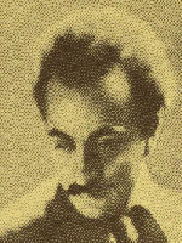Kahlil Gibran(1883-1931)
 わたしが30代のとき、米国に駐在していたときにもっとも感銘をうけ、マネジメントにも役立ったのがKahlil Gibranの"The Prophet"という本であった。信頼で結ばれた部下が誕生日に贈ってくれた本である。そうでなければわたしの目に留まることもなかったであろう。一読すればわかるが、人間の叡智を凝縮したような言葉に満ちている。
わたしが30代のとき、米国に駐在していたときにもっとも感銘をうけ、マネジメントにも役立ったのがKahlil Gibranの"The Prophet"という本であった。信頼で結ばれた部下が誕生日に贈ってくれた本である。そうでなければわたしの目に留まることもなかったであろう。一読すればわかるが、人間の叡智を凝縮したような言葉に満ちている。
たとえば"On Joy & Sorrow"の章には、こんな一節がある。
Your joy is your sorrow unmasked.
And the selfsame well from which your laughter rises was oftentimes filled with your tears.
And how else can it be?
The deeper that sorrow carves into your being, the more joy you can contain.
悲しみが深ければ深いほどそれだけ大きな喜びを感じるものである。喜怒哀楽、プラスマイナスに揺れながら生きているのが人間というものでしょう。その振幅の幅は人により違って当然で、振幅が激しいとき、「波乱怒涛の人生」などといったりする。どちらが良い悪いの問題ではない。人それぞれの生き方であり天の定めというものでしょう。
Gibran's works were especially influential in the American popular culture in the 1960s. In 1904 Gibran had his first art exhibition in Boston. From 1908 to 1910 he studied art in Paris with August Rodin. In 1912 he settled in New York, where he devoted himself to writing and painting. Gibran's early works were written in Arabic, and from 1918 he published mostly in English. In 1920 he founded a society for Arab writers, Mahgar (al-Mahgar). Among its members were Mikha'il Na'ima (1889-1988), Iliya Abu Madi (1889-1957), Nasib Arida (1887-1946), Nadra Haddad (1881-1950), and Ilyas Abu Sabaka (1903-47). Gibran died in New York on April 10, 1931. Among his best-known works is THE PROPHET, a book of 26 poetic essays, which has been translated into over 20 languages. The Prophet, who has lived in a foreign city 12 years, is about to board a ship that will take him home. He is stopped by a group of people, whom he teaches the mysteries of life.